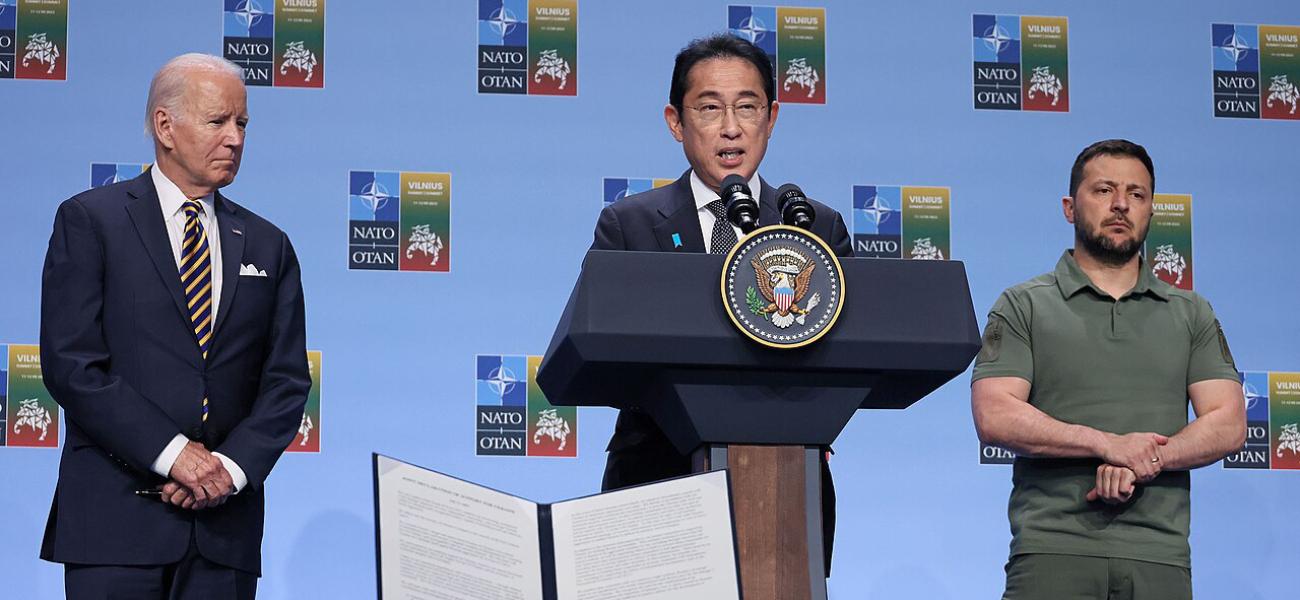
Expert Survey: Should US Offer Ukraine Security Guarantees?
This week has seen U.S. and Ukrainian officials launch negotiations on bilateral security commitments for Ukraine per the joint declaration of support for Kyiv adopted by G-7 countries ahead of July’s NATO summit in Lithuania. Commenting on the U.S.-Ukrainian talks, Andriy Yermak, chief of staff for Ukrainian President Volodymyr Zelensky, said that "security guarantees for Ukraine will be concrete, long-term obligations ensuring Ukraine's capacity to defeat and restrain Russian aggression in the future.” “These will be clearly drafted formats and mechanisms of support,” he added.
But does the U.S. need to offer security guarantees to Ukraine? If yes, then why and what should they look like? If not, why not? We posed these questions to four prominent U.S. experts on post-Soviet Eurasia, including Thomas Graham of the Council on Foreign Relations, the Atlantic Council’s Melinda Haring, Mark N. Katz of George Mason University and Joshua Shifrinson of the University of Maryland.
Graham believes that the U.S. should provide security guarantees to Ukraine as part of a larger effort to create a security system in Europe—one that with time reintegrates Russia, while Haring argues that NATO membership for Ukraine is the only way forward. Katz, meanwhile, believes that there are no easy answers, as both offering guarantees and not doing so have serious potential drawbacks for the U.S. Last but not least, Shifrinson argues that even Article 5-type guarantees pose real risks for questionable gains, in light of America’s limited interests in Ukraine.
Find their full responses below, in alphabetical order.

Thomas Graham
Distinguished fellow, Council on Foreign RelationsThe United States should provide Ukraine security guarantees as part of a larger effort to rebuild a robust security system in Europe that eventually reintegrates Russia. With regard to Ukraine, the goal should be to provide a security framework in which Kyiv can undertake the necessary reforms to build a strong, democratic, prosperous country that is increasingly anchored in Europe, to include in time membership in the European Union and NATO. Such a Ukraine would serve as the most formidable barrier to Russian aggression and expansionist impulses. Historically, Russian expansion westward has ended when it ran into strong, well-ordered states.
The nature of U.S. guarantees should be similar to the support it is now providing in Ukraine’s war with Russia: increasingly sophisticated weapons, close military and intelligence cooperation and financial assistance, all with the understanding that the United States will not engage directly in the military defense of Ukraine. Once the acute phase of current military conflict has passed, the United States should help Ukraine rebuild and modernize its defense-industrial sector so that Ukraine can produce the lion’s share of the weaponry it needs for territorial defense. Ideally, these guarantees would be reinforced by similar measures from Ukraine’s other partners, but in the end the United States should be prepared to provide them on its own.
This approach has parallels to the U.S. security relationship with Israel, although Israel’s security environment is radically different from Ukraine’s. It also has parallels with the U.S. security relationship with Sweden during the Cold War—especially the close military and intelligence consultations—with the difference that the ties with Ukraine would be public knowledge and not secret as they were with Sweden.

Melinda Haring
Non-resident senior fellow, Atlantic CouncilWashington needs to offer Ukraine an invitation to join the North Atlantic Treaty Organization (NATO) as soon as the war ends. NATO membership is the only real and lasting security guarantee that will keep the peace in Europe.
Alternative security guarantees that are being floated may sound appealing in well-appointed think tanks and universities, but they will not work. Weapons and money, even for long periods of time, are not security guarantees.
Despite recognizing that Ukraine requires long-term security guarantees, the Biden administration is unmovable and refuses to give Ukraine an invitation to join NATO. Instead, it has suggested the so-called Israeli model, a model that only works because there’s a long-standing and unchanging bipartisan consensus on Israel in the United States and Israel has nuclear weapons. Neither condition is true about Ukraine.
Even the most hawkish security guarantees that Washington could come up with—a 10-year commitment of maximum support, unlimited weapons, a long-term commitment to speeding up supply chains to increase the amount of shells Ukraine can fire—can be undone in a moment’s notice.
Donald J. Trump looms and he leads in the polls [of potential GOP presidential candidates]. If Trump is re-elected, he would end any security guarantees President Biden and his team put in place on day one. And it’s not just Trump. Beating up Ukraine is the flavor of the month. All three leading GOP presidential candidates compete to see who can bash Ukraine more.
President Biden should consider his legacy. He considers himself a foreign policy jock, but his record belies his self-perception. It’s not too late for him to make history and lock Ukraine’s place into Europe once and for all.
Eventual NATO membership is the only lasting security guarantee that Washington should back. Anything short of NATO is an imitation.

Mark N. Katz
Professor of government and politics, George Mason University - Schar School of Policy and GovernmentThere are serious potential drawbacks for the U.S. both of offering security guarantees to Ukraine and of not doing so. For the U.S.—with or without NATO—to offer security guarantees to Ukraine now while conflict between Russia and Ukraine is still ongoing poses the risk of a wider conflict between Russia on the one hand and the U.S. and NATO on the other. Yet not offering security guarantees risks hardening Putin’s purported belief that the U.S. and Western commitment to Ukraine will diminish with time and that Russia can prevail through persistence.
Offering U.S. security guarantees beginning after the end of the Russia-Ukraine war decreases the risk of a wider U.S.-Russian conflict but may well serve to motivate Moscow to continue the war in order to prevent these security guarantees from being implemented. Not offering U.S. security guarantees beginning even after the war ends, though, may have the perverse effect of motivating Moscow to agree to a ceasefire and then resuming hostilities once Western support to Kyiv diminishes as the Kremlin might expect it to.
So what to do? What is important to keep in mind is that the question of whether or not to offer security guarantees to Ukraine concerns not just protecting Ukraine but also impacting Russian behavior. Washington, then, could do well to offer Moscow a choice along the following lines: end the war on the basis of a Russian withdrawal from occupied Ukrainian territory in exchange for Ukraine not joining NATO, or end the war with a ceasefire in which Russia does not withdraw from occupied Ukrainian territory but Ukraine joins NATO and NATO forces are deployed to Kyiv, Odesa and elsewhere in Ukraine—something akin to the U.S. security guarantee to (and military presence in) the Republic of Korea.
This offer would provide the Russian leadership—especially those wishing to end the costs to Russia that continuing the war entails—a strong incentive to agree to a settlement involving the withdrawal of Russian forces from Ukraine. On the other hand, if Moscow really wants to end the war but keep the territory its forces now occupy, it can only do so at the cost of Ukraine joining NATO and vastly increasing the risk to Moscow of attempting to take more territory later.
Even if Moscow chooses the latter, neither Ukraine nor the West should recognize Moscow’s claims to occupied Ukrainian territory. A final determination about it can only be made through internationally recognized and administered referenda among inhabitants of these territories at the time of their annexations by Russia (including those in 2014). Such a settlement, however, can only occur once a post-Putin government that seeks good relations with the West is in place in Russia. And that may not occur for a very long time.

Joshua Shifrinson
Associate Professor, University of Maryland’s School of Public PolicyA security guarantee is a promise to provide certain kinds of security assistance to another actor under specified conditions. The difficulty with security guarantees for Ukraine, however, is that Kyiv doesn’t just want any kind of security guarantee. Rather, and for understandable reasons, it wants something akin to NATO Article 5 guarantees, whereby the guarantors would promise to treat an attack on Ukraine as an attack on themselves and join the conflict should war again erupt between Ukraine and Russia.
As I’ve written elsewhere, admitting Ukraine into NATO and providing it with Article 5 security guarantees is a terrible idea. The same issues apply to a bilateral or multilateral Article 5-esque guarantee. The United States has limited interests in Ukraine, and Washington has demonstrated throughout the current war that it does not view Ukraine as an issue worth fighting over. Extending Article 5-type guarantees would thus be an invitation for Russia to challenge these commitments, leaving the United States (and potentially NATO) in the awful position of having to back down and risk its credibility, or escalating and so starting what President Biden has called a World War III scenario with Russia. Ultimately, extending this kind of security guarantee requires the guarantors to engage in deterrence and defense on Ukraine’s behalf, which require hard sacrifices and dangerous choices. It would run real risks for questionable gains.
Lesser forms of security guarantees—for instance, a promise to ramp up military assistance should Russia-Ukraine problems escalate—are less objectionable and have a certain appeal. Still, we ought to be cautious. Russia, for example, might see these guarantee as insufficiently threatening and so take advantage of an opportunity to embarrass the United States and Ukraine together. Meanwhile, Ukraine itself might believe that, with some guarantees in hand, it might be able to extract additional concessions if strategic conditions were just right; we shouldn’t rule out attempts to pocket U.S. guarantees and press for more, potentially engaging in reckless foreign behavior to do so.
In short, security guarantees are a fraught game. Their political appeal is obvious, and Kyiv likely needs some kind of guarantee for when the present conflict ends. Still, Washington needs to proceed with extreme caution: in light of the United States’ limited interests in Ukraine, it must recognize that any guarantee exposes it to future risks even as it helps address current dilemmas.
Opinions expressed herein are solely those of the respondents. Main photo by 首相官邸ホームページ shared via a CC BY 4.0 license.
